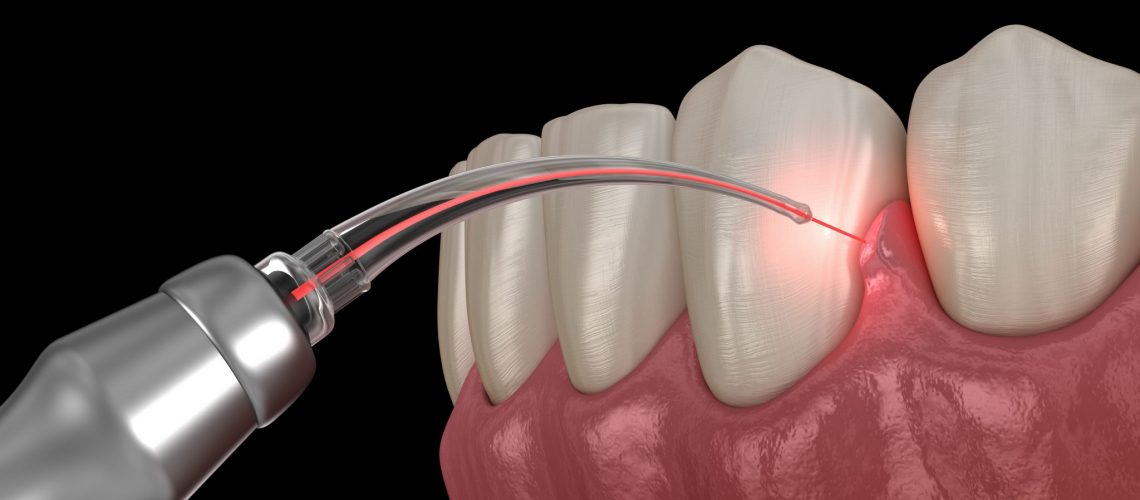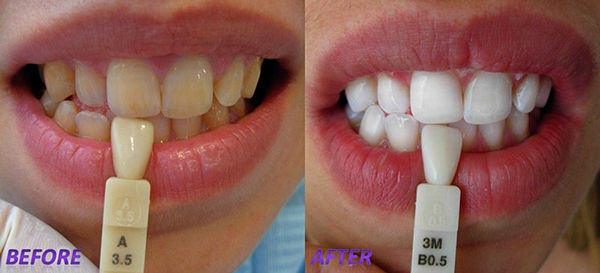Have you ever wondered if laser teeth whitening has any side effects? Well, rest assured, because in this article we are going to explore just that. Many people are intrigued by the idea of achieving a brilliantly white smile through laser teeth whitening, but hesitate due to concerns about potential side effects. Let’s take a closer look at this popular cosmetic dental procedure and unravel whether there are any drawbacks to achieving that radiant smile you’ve been dreaming of.

This image is property of thefoleckcenter.com.
Common Side Effects
Tooth Sensitivity
One common side effect of laser teeth whitening is tooth sensitivity. This occurs when the nerves in your teeth become temporarily sensitized to hot or cold stimuli. You may experience a sharp, stinging sensation or discomfort when consuming hot or cold foods and beverages. Fortunately, this side effect is usually temporary and should subside within a few days or weeks.
Gum Irritation
Another common side effect of laser teeth whitening is gum irritation. During the whitening process, the concentrated whitening gel used can come into contact with your gum tissue, causing it to become red, swollen, or even bleed slightly. This can be uncomfortable but should resolve on its own within a few days. To minimize this side effect, it is important for the practitioner to properly protect your gums before beginning the treatment.
Tooth Pain
Some individuals may experience tooth pain after laser teeth whitening. This can be caused by the increased sensitivity of the teeth or as a result of the whitening gel irritating the nerves. The pain is usually manageable and can be relieved with over-the-counter pain medication. If the pain persists or becomes severe, it is recommended to consult with your dentist.
Temporary White Spots
Temporary white spots may appear on your teeth immediately following laser teeth whitening. These spots are usually a result of the demineralization of the tooth enamel caused by the whitening process. Over time, these spots should fade and your teeth will regain their normal appearance. To prevent or minimize the occurrence of these white spots, it is important to follow the aftercare instructions provided by your practitioner.
Gum Sensitivity
In some cases, laser teeth whitening can cause gum sensitivity. This can manifest as tenderness or discomfort in the gum tissues. To minimize this side effect, it is essential to choose a skilled practitioner who will take necessary precautions to protect your gums during the treatment and provide proper aftercare instructions.

This image is property of www.aurorayongedental.com.
Rare Side Effects
Permanent Teeth Sensitivity
Although rare, some individuals may experience permanent teeth sensitivity following laser teeth whitening. This occurs when the nerves in the teeth are permanently damaged or irritated by the whitening process. It is crucial to choose a skilled and experienced practitioner to minimize the risk of this side effect. If you experience persistent teeth sensitivity, it is recommended to consult with your dentist for further evaluation and treatment options.
Allergic Reactions
While uncommon, allergic reactions to the whitening gel used in laser teeth whitening can occur. These reactions can manifest as itching, swelling, or redness in the oral tissues or even more severe symptoms such as difficulty breathing or anaphylaxis. If you have a known allergy to any of the ingredients in the whitening gel, it is important to inform your dentist beforehand to avoid any potential allergic reactions.
Burns
In rare cases, laser teeth whitening can cause burns on the gums or other soft tissues in the mouth. This typically occurs when the whitening gel comes into direct contact with the gums or if the laser is used incorrectly. To minimize the risk of burns, it is crucial to choose a practitioner who has the necessary expertise and experience in performing laser teeth whitening procedures.
Gum Recession
Gum recession is another rare but possible side effect of laser teeth whitening. This occurs when the gum tissue begins to pull away from the teeth, exposing the sensitive roots. Gum recession can lead to increased sensitivity, tooth pain, and even tooth loss if left untreated. To minimize the risk of gum recession, it is important to choose a skilled practitioner who will take necessary precautions to protect your gum tissue during the treatment.
Enamel Damage
In rare cases, laser teeth whitening can result in enamel damage. Enamel is the outermost layer of the teeth and is crucial for protecting the underlying structures. Excessive or improper use of the whitening gel or laser can weaken or damage the enamel, leading to increased tooth sensitivity, discoloration, or even tooth decay. It is essential to choose a skilled practitioner who will properly assess the condition of your teeth and ensure the appropriate level of whitening is performed to avoid any potential enamel damage.

This image is property of www.novelsmiles.com.
Factors Affecting Side Effects
Treatment Intensity
The intensity of the laser teeth whitening treatment can contribute to the occurrence of side effects. Higher intensity treatments may lead to increased tooth sensitivity, gum irritation, or other complications. It is important for the practitioner to carefully assess your teeth and determine the appropriate intensity of the treatment to minimize the risk of side effects.
Individual Sensitivity
Each individual’s teeth and gums may react differently to laser teeth whitening. Some individuals may be more prone to experiencing side effects due to their overall oral health or inherent sensitivity. It is important to discuss any pre-existing dental conditions or known sensitivities with your dentist before proceeding with the treatment.
Pre-existing Dental Problems
Individuals with pre-existing dental problems, such as tooth decay, gum disease, or exposed tooth roots, may be more prone to experiencing side effects of laser teeth whitening. These underlying conditions can increase the risk of tooth sensitivity, gum irritation, or other complications. It is essential for the practitioner to thoroughly assess your dental health before recommending laser teeth whitening.
Inadequate Aftercare
Proper aftercare following laser teeth whitening is crucial to minimize the occurrence of side effects and aid in the healing process. Failure to follow the aftercare instructions provided by your practitioner can increase the risk of complications, such as prolonged tooth sensitivity or gum irritation. It is important to prioritize your oral hygiene routine and avoid consuming staining substances or foods that can further irritate your teeth and gums.
Inexperienced Practitioners
The skill and experience of the practitioner performing the laser teeth whitening procedure can significantly impact the occurrence of side effects. Inexperienced practitioners may apply too high an intensity or fail to properly protect the gums, leading to burns, gum irritation, or other complications. It is essential to choose a skilled and reputable practitioner who has the necessary expertise in performing laser teeth whitening procedures.

This image is property of www.byrdie.com.
Minimizing Side Effects
Choosing a Skilled Practitioner
The key to minimizing the side effects of laser teeth whitening is choosing a skilled and experienced practitioner. Take the time to research and read reviews to ensure the practitioner you choose has a good reputation and a track record of successful treatments. A skilled practitioner will properly assess your dental health, use appropriate measures to protect your gums, and perform the treatment with the right intensity to minimize the risk of side effects.
Pre-treatment Dental Examination
Before undergoing laser teeth whitening, it is important to have a thorough dental examination. This allows the practitioner to identify any pre-existing dental problems that may increase the risk of side effects. By addressing these issues before the whitening procedure, the practitioner can ensure the treatment is safe and tailored to your specific needs.
Following Aftercare Instructions
Proper aftercare is crucial to minimize the occurrence of side effects and promote the healing process. Follow the aftercare instructions provided by your practitioner, which may include avoiding certain foods or beverages, using desensitizing toothpaste, or practicing good oral hygiene. By diligently following these instructions, you can help reduce the risk of tooth sensitivity, gum irritation, or other complications.
Using Desensitizing Toothpaste
If you experience tooth sensitivity after laser teeth whitening, using desensitizing toothpaste can help alleviate the discomfort. Desensitizing toothpaste contains ingredients that block the nerve sensitivity, providing relief from tooth sensitivity. Consult with your dentist for recommendations on the best desensitizing toothpaste suited for your needs.
Avoiding Staining Substances
To maintain the results of your laser teeth whitening treatment and minimize the risk of side effects, it is important to avoid consuming staining substances. These include coffee, tea, red wine, tobacco, and certain colored foods or beverages. Staining substances can compromise the whiteness of your teeth and may lead to increased tooth sensitivity or discoloration.

This image is property of www.encinodentalassociates.com.
Conclusion
Laser teeth whitening can effectively transform your smile and boost your confidence, but it is essential to be aware of the potential side effects. While most side effects are temporary and easily manageable, it is important to choose a skilled practitioner and follow proper aftercare instructions to minimize the risk. By understanding the potential side effects, factors influencing their occurrence, and implementing the recommended measures to minimize them, you can enjoy the benefits of laser teeth whitening with confidence and a brighter smile. Remember to prioritize your oral health and consult with your dentist if you have any concerns or experience persistent side effects.